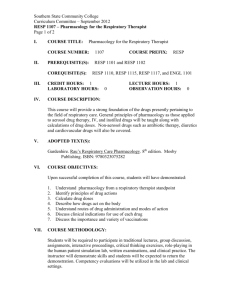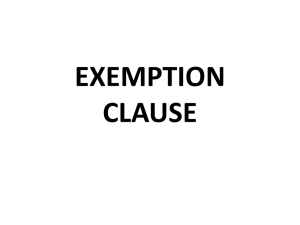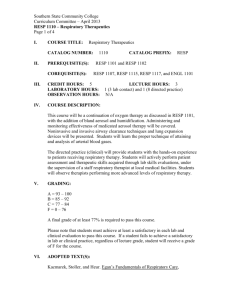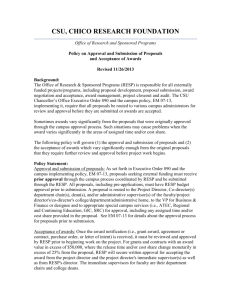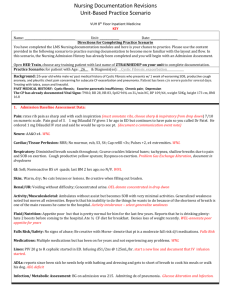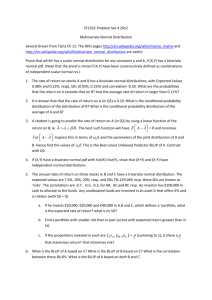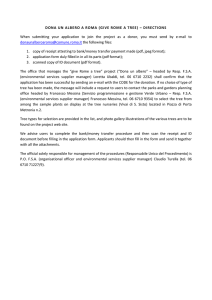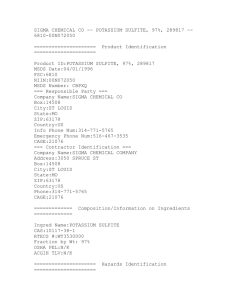AS in Respiratory Care - Dakota State University
advertisement
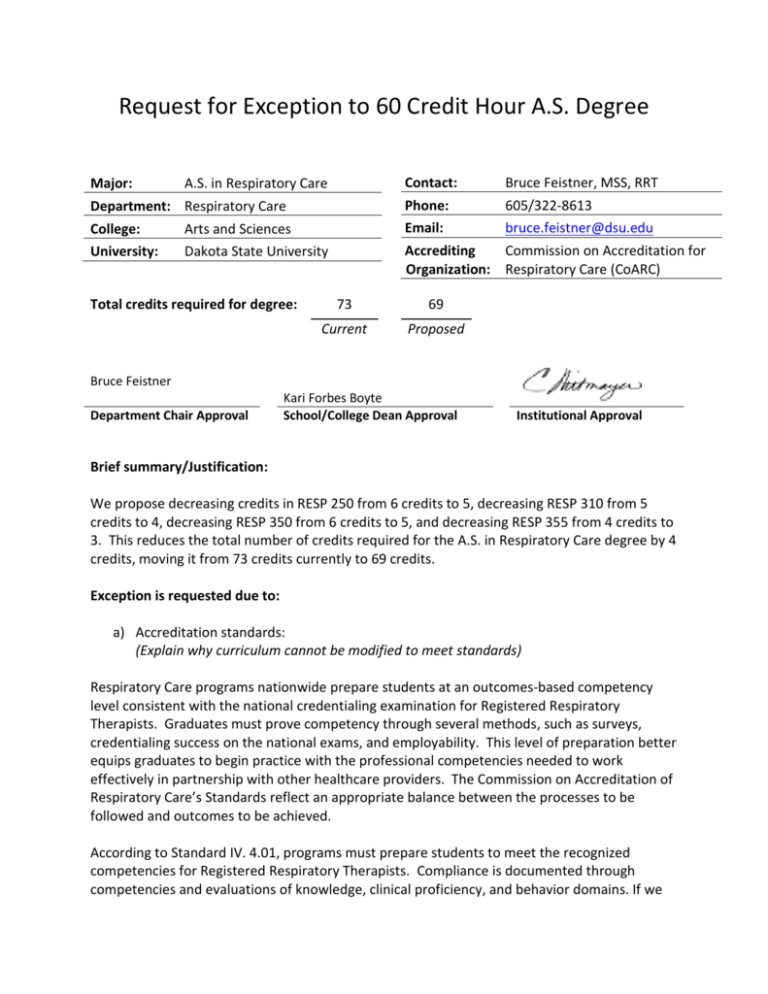
Request for Exception to 60 Credit Hour A.S. Degree Contact: Bruce Feistner, MSS, RRT Department: Respiratory Care Phone: 605/322-8613 College: Arts and Sciences Email: bruce.feistner@dsu.edu University: Dakota State University Accrediting Commission on Accreditation for Organization: Respiratory Care (CoARC) Major: A.S. in Respiratory Care Total credits required for degree: 73 69 Current Proposed Bruce Feistner Department Chair Approval Kari Forbes Boyte School/College Dean Approval Institutional Approval Brief summary/Justification: We propose decreasing credits in RESP 250 from 6 credits to 5, decreasing RESP 310 from 5 credits to 4, decreasing RESP 350 from 6 credits to 5, and decreasing RESP 355 from 4 credits to 3. This reduces the total number of credits required for the A.S. in Respiratory Care degree by 4 credits, moving it from 73 credits currently to 69 credits. Exception is requested due to: a) Accreditation standards: (Explain why curriculum cannot be modified to meet standards) Respiratory Care programs nationwide prepare students at an outcomes-based competency level consistent with the national credentialing examination for Registered Respiratory Therapists. Graduates must prove competency through several methods, such as surveys, credentialing success on the national exams, and employability. This level of preparation better equips graduates to begin practice with the professional competencies needed to work effectively in partnership with other healthcare providers. The Commission on Accreditation of Respiratory Care’s Standards reflect an appropriate balance between the processes to be followed and outcomes to be achieved. According to Standard IV. 4.01, programs must prepare students to meet the recognized competencies for Registered Respiratory Therapists. Compliance is documented through competencies and evaluations of knowledge, clinical proficiency, and behavior domains. If we decrease the credits of our major classes any further beyond our proposal, students may not have enough exposure to critical techniques and procedures and will fall behind in their skills on entry to the workforce. According to Standard IV. 4.04, the curriculum’s content must be integrated to ensure achievement of the curriculum’s defined competencies. If credits are decreased below our proposal, our students may not identify the linkages between all segments of the curriculum (classroom, lab and clinical), which will decrease their effectiveness in patient care. According to Standard IV. 4.12, clinical education experiences at clinical sites must be of sufficient quality and duration to enable students to meet program goals and acquire the competencies needed for clinical practice. If hours are reduced below our proposal, especially the clinical rotation classes, students may feel more rushed to complete evaluations on procedures every semester, possibly leading to lower grades, confidence, and skills. Adequate time must be ensured during clinical rotations to allow students to process information from classroom and lab experiences, and then apply it to the clinical areas. Although we are not required to meet a minimum number of lecture or lab or clinical hours, time and contact must be adequate to train students in the techniques and procedures to be successful and accurate on the job. Our graduates are evaluated instead of the processes to get them to that stage. Our reaccreditation results have always been positive, and decreasing credits further would negatively impact the quality of our graduates. We are unable to cut any other hours of training from the professional (RESP-prefix) classes without jeopardizing the training level and graduate potential of our students. It should also be noted that the A.S. in respiratory care already has an exception for general education, completing one additional science course rather than the 3 credits of social sciences and 3 credits of arts and humanities generally expected for 2-year programs. A comparison was made with other respiratory care programs in the surrounding states (MN, IA, NE, WY, and MT) to determine the number of credits they require for an AS in respiratory care degree: College and Location Saint Paul College, St Paul, MN Northland Community & Technical College, East Grand Forks, MN Lake Superior College, Duluth, MN Kirkwood Community College, Cedar Rapids, IA Des Moines Area Community College, Ankeny, IA Hawkeye Community College, Waterloo, IA Northeast Iowa Community College, Peosta, IA St Luke’s College, Sioux City, IA AS Credits 78 78 76 82.5 79 75 86 74 Southeast Iowa Community College, West Burlington, IA Southeast Community College Lincoln, Lincoln, NE Metropolitan Community College, Omaha, NE Nebraska Methodist College, Omaha, NE Casper College, Casper, WY Montana State University Great Falls, Great Falls, MT University of Montana Missoula, Missoula, MT 72.5 79 88 79 83 72+pre-req 74 As can be seen, DSU’s current AS program with 73 credits is comparable to all the regional programs, and our proposed curriculum change would decrease it further, to 69 credits. Learning Domains Course Numbers That Address the Learning Domains BIOL 151, CHEM 112, CSC 105, MATH 102, BIOL 221, ENGL 101, HIM 130, RESP 105, SPCM 101, RESP 110, RESP 150, RESP 180, RESP 210, RESP 250, RESP 310, RESP 350, RESP 355, RESP 381, RESP 395 RESP 105, RESP 110, RESP 150, RESP 180, RESP 210, RESP 250, RESP 310, RESP 350, RESP 355, RESP 381, RESP 395 RESP 105, RESP 110, RESP 150, RESP 180, RESP 210, RESP 250, RESP 310, RESP 350, RESP 355, RESP 381, RESP 395 Cognitive (Knowledge) Psychomotor (Skills) Affective (Behaviors) Program requirements listed within the catalog: Current: BIOL 151 General Biology I CHEM 112 General Chemistry I CSC 105 Intro to Computers MATH 102 College Algebra BIOL 221 Human Anatomy ENGL 101 Composition I HIM 130 Basic Medical Terminology RESP 105 Resp Care Physical Science SPCM 101 Fundamentals of Speech RESP 110 Intro to Respiratory Care RESP 150 Clinical Experience I RESP 180 Pathophysiology for Resp Care RESP 210 Respiratory Critical Care RESP 250 Clinical Experience II Proposed: 4 cr 4 cr 3 cr 3 cr 4 cr 3 cr 2 cr 3 cr 3 cr 6 cr 6 cr 3 cr 5 cr 6 cr 5 cr RESP 395 Observation Practicum RESP 310 Advanced Respiratory Care RESP 350 Clinical Experience III RESP 355 Resp Care in Clinical Medicine RESP 381 Respiratory Care Management 2 cr 5 cr 6 cr 4 cr 1 cr 4 cr 5 cr 3 cr Total Credits: 73 cr 69 cr
